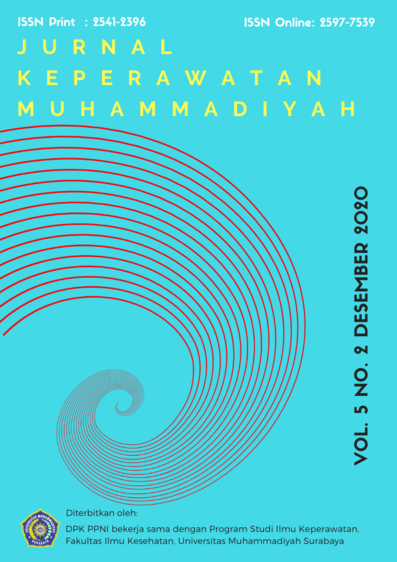Efektivitas Autogenic Training Terhadap Kecemasan Lansia: Literatur Review
DOI:
https://doi.org/10.30651/jkm.v5i2.5423Keywords:
Elderly, old people, Autogenic Training (AT), AnxietyAbstract
Purpose : Of this literature review writing is to determine the period of autogenic intervention.Â
Method : Â that was used in gathering article was using several electronic databases including PubMed, Science Direct, DOAJ and Google Scholar, reference sources were taken manually, with limitations on articles published from 2009 - 2019, with relevant keywords.
Results : The five articles used all fall into the Randomized Controlled Trial category. The results obtained from all articles that autogenic training can significantly reduce anxiety in the elderly where the p value <0.001.
Conclusion : Autogenic training can be recommended as a non-pharmacological therapy to reduce anxiety in the elderly. In this study health workers have a very important role because they can do autogenic training but must have competence by attending training on autogenic training.
References
Abadi, F., Abadi, F., Fereidouni, Z., Amirkhani, M., Karimi, S., & Najafi Kelyani, M. (2018). Effect of Acupressure on Preoperative Cesarean Section Anxiety. Journal of Acupuncture and Meridian Studies.
Aivazyan, T. A., & Zaitsev, V. P. (2018). The effectiveness of autogenic training in the psycho-corrective treatment of the patients presenting with chronic somatic diseases. Russian Research Center of Medical Rehabilitation and Balneology, 95(3), 11. https://doi.org/10.17116/kurort201895311
Candrawati, S. A. K., Dwidiyanti, M., & Widyastuti, R. H. (2018). Effects of Mindfulness with Gayatri Mantra on Decreasing Anxiety in the Elderly. Holistic Nursing and Health Science, 1(1), 35. https://doi.org/10.14710/hnhs.1.1.2018.35-45
Canuto, A., Weber, K., Baertschi, M., Andreas, S., Volkert, J., Dehoust, M. C., … Härter, M. (2018). Anxiety Disorders in Old Age: Psychiatric Comorbidities, Quality of Life, and Prevalence According to Age, Gender, and Country. American Journal of Geriatric Psychiatry, 26(2), 174–185. https://doi.org/10.1016/j.jagp.2017.08.015
da Costa Santos, C. M., de Mattos Pimenta, C. A., & Nobre, M. R. C. (2007). The PICO strategy for the research question construction and evidence search. Revista Latino-Americana de Enfermagem, 15(3), 508–511. Retrieved from http://www.ncbi.nlm.nih.gov/pubmed/17653438
Endredy, J. (2016). Advanced Autogenic Training and Primal Awareness. Rochester.
Francesco, P., Mauro, M. G., Gianluca, C., & Enrico, M. (2010). The efficacy of relaxation training in treating anxiety. International Journal of Behavioral Consultation and Therapy, 5(3–4), 264–269. https://doi.org/10.1037/h0100887
Frandsen, T. F. ;, & Eriksen, M. B. (2018). The impact of PICO as a search strategy tool on literature search quality: A systematic review. Journal of the Medical Library Association, 106(In press), 420–431.
Golding, K., Fife-Schaw, C., & Kneebone, I. (2017). Twelve month follow-up on a randomised controlled trial of relaxation training for post-stroke anxiety. Clinical Rehabilitation, 31(9), 1164–1167. https://doi.org/10.1177/0269215516682820
Hellwig, S., & Domschke, K. (2019). Anxiety in Late Life: An Update on Pathomechanisms. Gerontology, 65(5), 465–473. https://doi.org/10.1159/000500306
Hmwe, N. T. T., Subramanian, P., Tan, L. P., & Chong, W. K. (2015). The effects of acupressure on depression, anxiety and stress in patients with hemodialysis: A randomized controlled trial. International Journal of Nursing Studies, 52(2), 509–518. https://doi.org/10.1016/j.ijnurstu.2014.11.002
Kneebone, I., Walker-Samuel, N., Swanston, J., & Otto, E. (2014). Relaxation training after stroke: potential to reduce anxiety. Disability and Rehabilitation, 36(9), 771–774. https://doi.org/10.3109/09638288.2013.808275
Lane, J. R. (2009). The neurochemistry of counterconditioning: acupressure desensitization in psychotherapy. Energy Psychol, 1(1), 31–34.
Minowa, C., & Koitabashi, K. (2013). Effects of Autogenic Training on Perioperative Anxiety and Pain in Breast Cancer Patients : The Kitakanto Medical Journal, 63(1), 1–11. https://doi.org/10.2974/kmj.63.1
Miu, A. C., Heilman, R. M., & Miclea, M. (2009). Reduced heart rate variability and vagal tone in anxiety: Trait versus state, and the effects of autogenic training. Autonomic Neuroscience: Basic and Clinical, 145(1–2), 99–103. https://doi.org/10.1016/j.autneu.2008.11.010
Qu, F., Zhang, D., Chen, L.-T., Wang, F.-F., Pan, J.-X., & Zhu, Y.-M. (2014). Auricular Acupressure Reduces Anxiety Levels And Improves Outcomes Of In Vitro Fertilization: A Prospective, Randomized And Controlled Study. Fertility and Sterility, 4(5028), 1–7.
Richmond.R.L. (2012). A Guide to Psychology and its Practice. A Guide To Psychology and Practice. Retrieved from http://www.guidetopsychology.com/autogen.htm
Sonza, T., Badri, I. A., & Erda, R. (2020). Hubungan Tingkat Kecemasan Dengan Tingkat Kemandirian Activities of Daily Living PADA LANSIA. Human Care Journal, 5(3), 688. https://doi.org/10.32883/hcj.v5i3.818
Suliswati. (2012). Konsep Dasar Keperawatan Kesehatan Jiwa. jakarta: Penerbit Buku kedokteran EGC.
Wahyuningsih, & Astuti, E. (2013). Faktor yang Mempengaruhi Hipertensi pada Usia Lanjut. Journal Ners and Midwifery Indonesia, 1(3), 71–75. https://doi.org/2354-7642
Wolitzky-Taylor, K. B., Castriotta, N., Lenze, E. J., Stanley, M. A., & Craske, M. G. (2010). Anxiety disorders in older adults: a comprehensive review. Depression and Anxiety, 27(2), 190–211. https://doi.org/10.1002/da.20653
Downloads
Published
Issue
Section
License
- Penulis tetap memegang hak atas karyanya dan memberikan hak publikasi pertama kepada jurnal ini yang secara simultan karya tersebut dilisensikan di bawah:Â Creative Commons Attribution-ShareAlike 4.0 International (CC BY-SA 4.0)













